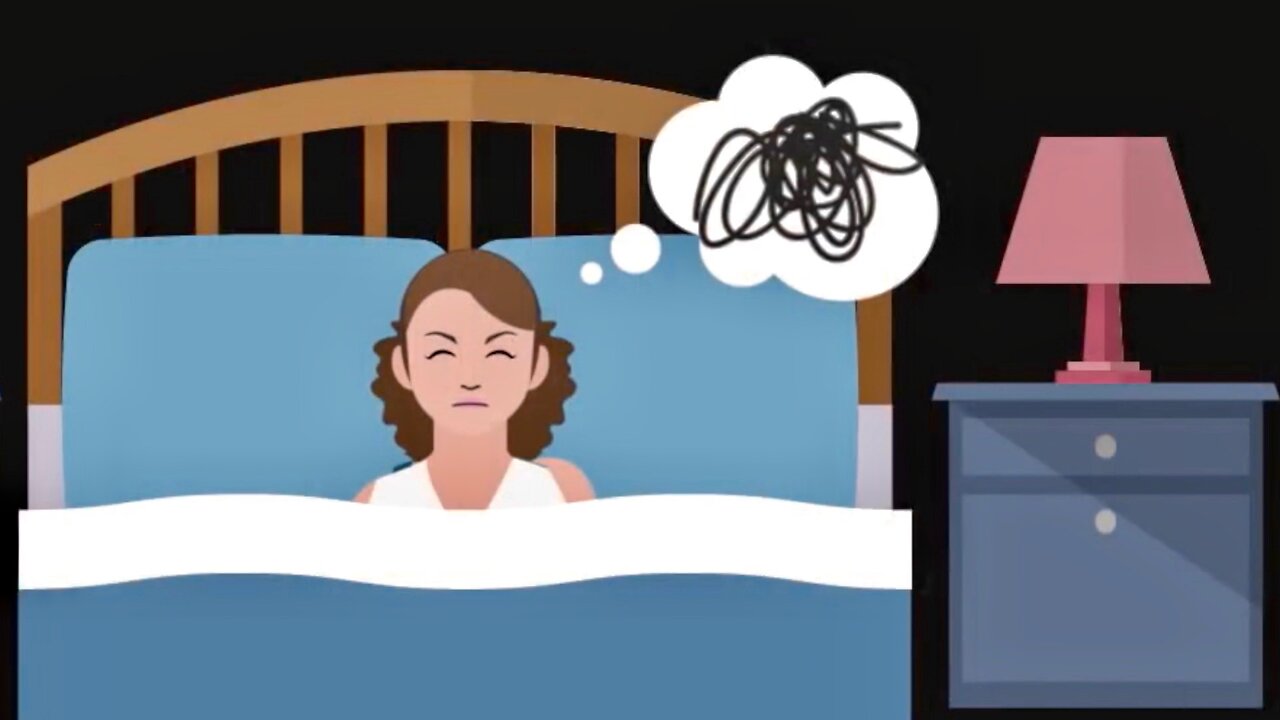Premium Only Content

Trouble Falling Asleep? ...Try These Scientific Tested Sleep Hacks
Scientific Tricks To Help You Get A Better Night's Sleep. 1. If you want to nap, do it between 1pm and 3pm. Your circadian rhythm makes you feel alert in the morning, peaking between 7am and 9am, but after 11am your alertness levels start to drop, reaching a low between 1 and 3pm. (Meaning that your mid-afternoon lethargy can't be entirely blamed on a lunchtime burrito.) Use the slump to your advantage and take a quick nap, if you're able to. If you don't have access to a bed, there are pillows you can buy to help you sleep on the go.
Your circadian rhythm makes you feel alert in the morning, peaking between 7am and 9am, but after 11am your alertness levels start to drop, reaching a low between 1 and 3pm. (Meaning that your mid-afternoon lethargy can't be entirely blamed on a lunchtime burrito.)
2. Drink a coffee before a quick nap.
Caffeine takes 20 minutes to get going, so downing an espresso immediately before a short nap will mean it kicks in as you're waking up, making you extra alert.
Caffeine takes 20 minutes to get going, so downing an espresso immediately before a short nap will mean it kicks in as you're waking up, making you extra alert.
3. Get some exercise.
Two and a half hours of moderate aerobic activity or one and a quarter hours of more vigorous activity per week will help you sleep at night. Just don't do it directly before going to sleep. "Exercise can make you all hot and sweaty, and you need time to cool down before heading to bed," writes Wiseman.
Two and a half hours of moderate aerobic activity or one and a quarter hours of more vigorous activity per week will help you sleep at night. Just don't do it directly before going to sleep. "Exercise can make you all hot and sweaty, and you need time to cool down before heading to bed," writes Wiseman.
4. Avoid bright screens in the few hours before bed.
Research has shown that blue light keeps you awake because it suppresses the production of melatonin. Sadly, that means TVs, computers, and smartphones, as well as providing you with things to do that keep you awake, could actually be stopping you getting to sleep when you want to.If you must work late, dim your phone screen as much as you can and use a program such as f.lux to get rid of that blue glow from your computer screen. You could even go as far as wearing amber-tinted glasses – they've been shown to improve sleep quality and mood.
Research has shown that blue light keeps you awake because it suppresses the production of melatonin. Sadly, that means TVs, computers, and smartphones, as well as providing you with things to do that keep you awake, could actually be stopping you getting to sleep when you want to.
5. Use neutral sounds to tackle noise pollution.
6. Wear a pair of warm socks if you're too cold, or stick your feet out of the duvet if you're hot.
Just over 18°C (65°F), and about 65% humidity, is the ideal room temperature for sleeping according to scientists. But make sure you take care of your feet too. According to Wiseman: "Blood flow distributes heat throughout your body, and if you have bad circulation, your extremities will get cold and cause sleeplessness." A pair of socks is an easy solution to that.On the other hand, if it's too warm, sticking your feet out of the duvet will help. "The basic point is to use your feet to regulate body temperature," Wiseman told BuzzFeed.
7. Have a bath just before bed.
A bath around bedtime has been shown to increase sleep quality. Scientists don't quite know why, but it might be because it mimics how your body temperature tends to fall slightly just before you fall asleep. According to Wiseman: "Lying in a warm bath artificially raises your body temperature, but when you climb out of the bath this temperature abruptly drops and sends a signal to your body that you are ready for sleep."
A bath around bedtime has been shown to increase sleep quality. Scientists don't quite know why, but it might be because it mimics how your body temperature tends to fall slightly just before you fall asleep.
8. List your problems and how you might solve them.
If you're having trouble sleeping because you're worrying about a problem at work or in your personal life, get your problems out of your head and on to a piece of paper. In one study, published in Behavioral Sleep Medicine, scientists split volunteers into two groups. Both wrote down three problems they had. But one group also wrote down possible solutions, and those people were more relaxed when they went to bed.
9. Eat a small, carb-filled supper before bed.
"Research shows that you can easily increase your chances of getting a good night’s sleep by eating a small portion (under 200 calories) of food that is rich in carbohydrates," advises Wiseman. Try a slice of toast, or a small bowl of cereal.
Music: Kaddish (Angelic Instrumental) by Dhruva Aliman
Amazon- https://amzn.to/3dgKA52
https://music.apple.com/us/artist/dhruva-aliman/363563637
https://dhruvaaliman.bandcamp.com/album/hard-to-get-along
http://www.dhruvaaliman.com/
Spotify - https://open.spotify.com/artist/5XiFCr9iBKE6Cupltgnlet
#rest
#health
#sleep
-
 6:57
6:57
Seeker Land
3 months agoMAN AND BEAST - Part 13
63 -
 10:23
10:23
TheSaltyCracker
15 hours agoMuslims Immediately Threaten New Yorkers After Zohran Win
20.4K402 -
 18:40
18:40
Actual Justice Warrior
15 hours agoMamdani Pledges To DESTROY New York
1.86K35 -
 28:53
28:53
iCkEdMeL
15 hours agoBREAKING: 9 DEAD After UPS Plane BURSTS Into Fireball at Louisville Airport
21.6K7 -
 20:52
20:52
Professor Nez
18 hours agoThe TRUTH is Actually WORSE than we Thought...
9.26K17 -
 8:59
8:59
MattMorseTV
17 hours ago $0.03 earnedTrump’s DIRE WARNING to the Senate GOP.
72.7K81 -
 2:13:33
2:13:33
Side Scrollers Podcast
19 hours agoAsmongold SUED for Emotional Distress + Hasan REJECTED+ INSANE Plane Crash + More | Side Scrollers
81K24 -
 21:39
21:39
Nikko Ortiz
4 days agoI Take A North Korean Shooting
79.8K11 -
 23:01
23:01
GritsGG
17 hours agoWarzone Solo Dubular! Last Night Time Solo???
13.6K2 -
 22:47
22:47
The Pascal Show
14 hours ago $0.02 earnedTHEY’RE HIDING EVIDENCE?! Candace Owens EXPOSES Foreign Connection In Charlie Kirk Shooting
22.2K24